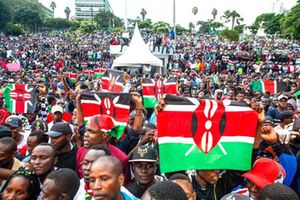
President William Ruto (centre) surrounded by other African leaders delivers his closing speech during the closure of the Africa Climate Summit 2023 at the Kenyatta International Convention Centre in Nairobi on September 6.
Africa must urgently develop a comprehensive continental security strategy to avert a looming return another phase of “lost decades”, which plunged it into violent conflict, economic meltdown, poverty and external manipulation in the 1980-2000 period.
Three factors set the broader context for the events that defined 2024. One are the post-Covid-19 recovery plans of major global economies. Second is the security plan of the US to recover from its own lost decades (2000-2020) and to outmaneuver its main geopolitical competitors: mainly China and other BRICS powers. Third is the ongoing energy transition to renewable energy sources.
These factors have triggered a new scramble for Africa’s resources and influence. The big question is whether Africa will seize the decisive decade of 2025-2035 to advance its vital interests and pull its people from poverty to prosperity.
The year 2024 exposed the disturbing paradox of Africa as a continent of vast opportunities and daunting challenges, immense wealth and extreme poverty. As the world’s richest continent in natural resources, Africa is home to some 30 per cent of the world's mineral reserves, eight per cent of the world's natural gas and 12 per cent of the world's oil reserves. Projected to have the second-largest growth in gas supply by 2050, the future of oil and gas in Africa looks bright. It also has the most arable land and waterpower in the world, nine of the world’s twenty fastest growing economies in 2024.
Democratic governance
Africa has made great strides in democratic governance, with 2024 rightly dubbed as “Africa’s year of elections.” Twenty-two African countries staged presidential, parliamentary or local elections. 2024 was also the year of opposition parties. In the elections held in eight countries or territories, incumbents held power in three while the opposition gained a majority in the rest. The transfers of power was smooth and peaceful, signifying the maturity of democracies in Africa.
In 2024, Africa’s population crossed the 1.5 billion mark, and is projected to reach 2.5 billion by 2050. Africa continues to be the youngest continent. The proportion of its youth population (15-24 years) stood at 19.4 per cent in 2024.
Despite these opportunities, in 2024 Africa witnessed the tragic return of conflict, political instability and suffered the ripple effects of climate change and global geopolitics. These, in turn, slowed down investment growth, widened the inequality gap and contributed to poverty.
In 2024 Africa continued to bear the brunt of human-driven climate change despite being the world’s least polluter or producer of global emissions of greenhouse gases. Global warming intensified the rainy season in many African countries in 2024, sparking deadly floods, which killed about 1,500 people and displaced more than one million in West and Central Africa, according to UN aid agency OCHA.
Climate change has also wreaked havoc on Africa’s food security as famine and floods ravage the continent. In 2024, 163 million Africans, over one-tenth of the continent's population, faced acute food insecurity. Twenty-three of Africa’s 54 countries had at least 10 per cent of their populations facing acute food insecurity.
The result is increased extreme poverty rate, which stood at around 45 per cent in rural Africa, compared to seven per cent in urban areas. Alarmingly, 468 million Africans are living in extreme poverty, up from 285 million in 1990.
Even more worrying is the return of armed conflict. In 2024, more than 35 armed conflicts were reported. These attracted the intervention of Western powers, neighboring countries or even mercenaries, thus straining already fragile and fractured regions, compounding crises of governance, opening the floodgates for foreign exploitation, proxy wars, resource trafficking, ‘multilateral colonialism’.
Ethiopia’s move on January 1, 2024 to sign an agreement with the Somaliland territory of Somalia for access to a coastal strip near the port of Berbera on the Gulf of Aden in return for its formal recognition of the sovereignty of Somaliland, stoked tensions with Somalia. If not resolved, this could destabilise the entire Red Sea and Horn of Africa region.
In 2024, violent events and fatalities involving militant Islamist groups in Africa increased. Approximately 11,000 people were killed in Sahel through militant Islamist activity. The instability in Africa’s Sahel region can be traced back to the Nato intervention in Libya in 2010 to remove Muamar Gadaffi. Far from bringing long-term stability and democracy to Libya, the intervention has destabilised the Sahel and parts of West Africa.
Continued exploitation
Africa has also witnessed the return of military juntas, many of them emancipatory or good coups resisting continued exploitation of African resources by former colonial powers. Activities of Western forces and mainly Russian mercenaries have also increased the militarization and fragility of the region.
In Sudan, geopolitical competitions by foreign powers has led to the deployment of drones, munitions and mercenaries in a new scramble for regional resources and influence. The civil war in Sudan complicated internal conflicts in Libya, Chad, Central African Republic, South Sudan and Ethiopia. Democracies have increasingly turned rogue signified by a wave abductions in Kenya, Cameroon, Chad and Central Africa republic. In Kenya, abductions of vocal youths have been reported since the Gen-Z revolt in June-July 2024.
2024 also witnessed the forceful return of bandits and pirates, turning Red Sea and the Western Indian Ocean into zones of maritime vulnerability. In 2024, over 100 attacks by Houthi militia in Yemen and pirates operating from Somalia were reported in the Red Sea and Western Indian Ocean. With the pirates back, the Horn region needs the equivalent of the Yaounde Protocol on maritime security, which enabled members to enhance patrols and collaboration and piracy and armed robbery at sea in the Gulf of Guinea to their lowest levels in 2024.
Escalating conflict, extreme weather, food shortages militias and pirates have spawned a profound forced displacement crisis. In 2024, Africa’s forcibly displaced population hit the 45 million mark. This is 3 percent of its total population.
The African Union and its regional blocs main powers need to develop clear Continental Security plan to avert the lost decades.
Professor Peter Kagwanja is the co-Author of the The Power of Minerals: How Africa Can Benefit from the Energy Revolution (Nairobi: Tafiti House Publishers, 2025).










